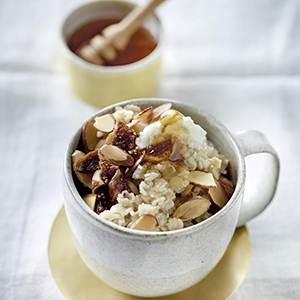Five Foods For Your Heart Health

Fig and Ricotta Oatmeal
Along with Valentine’s Day, February also marks American Heart Month.
Heart health deserves attention because heart disease is the leading cause of death for both men and women in the U.S. — about one in every four deaths. Several medical and lifestyle choices may put people at a higher risk for heart disease, including: high blood pressure, high cholesterol, smoking, diabetes, obesity and being overweight, poor diet, physical inactivity and excessive alcohol use. The good news is that several of these risk factors may be influenced by simple changes in lifestyle, such as what you choose to eat.
Follow these five simple ways to invest in your heart health.
1. Soy Protein: Aim for 25 grams (or around three servings) per day of soy protein from sources such as soynuts, edamame, soymilk, tofu or tempeh. Research shows that soyfoods may help lower cholesterol because of their beneficial fatty acids, the phytochemical called isoflavone and their protein content.
2. Nuts: Aim to eat 1.5 ounces per day of nuts. That’s roughly a handful (about 12 Brazil nuts, 22 pecan halves, 27 cashews, 36 almonds, 65 peanuts or 73 pistachios). Nuts are a rich source of heart-healthy fats, fiber, plant protein, essential vitamins and minerals and other phytochemicals that appear to have antioxidant and anti-inflammatory properties.
3. Plant Sterols: Aim for two to three grams per day of plant sterols (compounds found in plant cell membranes). Plant sterols resemble cholesterol, which makes it difficult for the digestive tract to distinguish between the two and thus may help reduce cholesterol absorption. Small amounts of plant sterols are found naturally in fruits, vegetables, nuts, seeds, cereals, legumes and vegetable oils. Larger amounts have been added to margarines (Promise Activ or Benecol) and orange juice (Minute Maid Heart Wise).
4. Fiber: Aim for at least 25 to 30 grams per day of fiber. Dietary fiber may help to lower cholesterol and reduce the risk of developing cardiovascular disease. Yet only five percent of the population is estimated to be getting the recommended daily amount. To increase fiber in the diet, choose more whole grains (such as oatmeal, whole-wheat bread or pasta, brown or wild rice, quinoa, wheatberries or popcorn), legumes, vegetables, fruits, nuts and seeds (such as flaxseed or chia seed).
5. Fish: The American Heart Association recommends eating two servings of fatty fish per week. Fatty fish, such as salmon, tuna, trout, mackerel, herring, sardines and anchovies, are high in omega-3 fatty acids which are essential but cannot be made in the body and therefore must come from food. Omega-3 fatty acids may help positively affect blood lipids and lower the risk of heart disease.
Decades ago, common heart-health nutrition recommendations included the advice to eat low-fat and low-saturated fat. However, when people were told to cut fat out of their diet, they ended up replacing it with processed carbohydrates and added sugar. This approach did not work to decrease heart disease.
Furthermore, nutrition researchers have adopted a more favorable view of total fat and a more neutral view of saturated fat. Rather than focusing on the foods to cut out with the latest diet fad, concentrate on the foods you can add in for a permanent lifestyle change.
Some studies have found that a dietary pattern that includes soy protein, nuts, plant sterols and soluble fiber may reduce blood cholesterol as much as medication. Invest in your heart health by simply adding a few of these five cholesterol-lowering foods to your shopping list.
Fig and Ricotta Oatmeal
Serves 1
All you need
•1 cup water
•Pinch of salt
•1/2 cup Hy-Vee old-fashioned rolled oats
•2 tbsp Hy-Vee Select part-skim ricotta cheese
•2 tbsp chopped dried figs
•1 tbsp toasted sliced almonds
•2 tsp Hy-Vee honey
All you do
1. Bring water and salt to a boil in a small saucepan. Stir in oats, reduce heat to medium and cook, stirring occasionally, until most of the liquid is absorbed, about 5 minutes.
2. Remove from heat, cover and let stand 2 to 3 minutes. Top with ricotta, figs, almonds and honey.
*Overnight oats variation: Combine half cup old-fashioned rolled oats with half cup water and a pinch of salt in a jar or bowl. Cover and refrigerate overnight. In the morning, add toppings. Eat cold or heat up. Makes about 1 cup.
*Steel-cut oats variation: Bring 1 cup water and a pinch of salt to a boil in a small saucepan. Add 1/3 cup steel-cut oats, reduce heat to a bare simmer, cover and cook, stirring occasionally, until most of the liquid is absorbed, 15 to 20 minutes. Remove from heat and let stand, covered, 2 to 3 minutes. Add toppings. Makes about 1 cup.
This information is not intended as medical advice. Please consult a medical professional for individual advice.
Story Credit: http://www.austindailyherald.com/2017/01/five-foods-for-your-heart-health/


